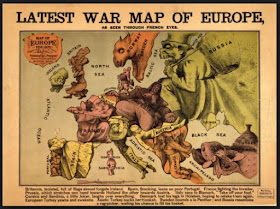Jonathan Freedland poses a dilemma; if you had just one
wish would it be to guarantee that Britain stays in the EU or that Trump does
not become president. No doubt when he dreamed up this devious binary contract
with the devil he imagined it would read as a masterly summation of the
principle problems with which the world is grappling. But, like other so-called
progressive missives to the little people, he hasn’t thought it through. Trump
becoming president isn’t the end of the world and it has zero bearing on whether
the UK stays subject to rule from Brussels. Like all Remain’s prognostications
it offers a false choice; stay and prosper or leave and die.
But if we do leave the EU it isn’t principally the UK
which will suffer, it is the whole EU project which is at stake. This is how it
goes: We vote to leave. They try to punish us by imposing nominal tariffs and
maybe even trade sanctions. We shrug, maybe suffer a dip in the flow of exotic
goods for a while but then concessions are made because business – the German
car trade for a start – will lobby to maintain its markets. As James Dyson has
said, of course trade with Europe will continue and continue largely unchanged.
Others will watch and then the dominoes will begin to
fall. Never entirely happy about their relationship, the Dutch will hold their
own in/out referendum, closely followed by others and once nations begin to
take back control of their destinies the EU will shrink back to become Germany
and France propping up the poor eastern states and wondering what to do about
Turkey. Greece is a lost cause, Italy is swamped by unwanted African and Middle
Eastern immigration and the shutters are going up everywhere. When war comes
there will not be the embryonic EU army to call on as each country will recall
their own troops to defend their own borders.
There is a certain inevitability about war in Europe. As
Freedland (rightly I believe) surmises, the EU has had a hand in staving it
off. But only in the manner of a pressure cooker lid; the simmering resentments
are still there, the old enmities only muted, not resolved. And as before,
Britain’s true place is as a powerful ally, not a neutered lap dog. The longer
we stay in the weaker we become until we are no use to anybody. It probably won’t
be World War Three, as some in the Remain camp have tried to suggest, it will
probably be more ‘Balkany’, but whether Britain is in or out the EU will be
weaker still afterwards.
'Twas ever thus.
The options are not a clear cut stay for peace or leave
for war; there are no such guarantees. But if and when war does come where do
we want to be? On the inside, weakened as a nation, less confident and legally bound
to send in troops against our own European fellow citizens? Or as a strong
bystander, wielding diplomatic clout from the outside and able to choose if and
when we intervene. Through history this has been our role; and history has a
habit of repeating itself. Vote out, for the future of Europe.

Competition improves things:
ReplyDeleteDiversity + competition = Progress
Politicians exist to limit the scope of that competition (pillage is SO C13th!) but low-quality politicians can also make it much worse (WW1, WW2 etc)
The EU's primary goal is to eliminate competition within it: this prevents wars (in theory) but also reduces progress and so, in a globalised world, destroys economies - societies, too.
So the EU sowed the seeds of its own destruction in one of the key phrases of The Treaty of Rome: 'ever-closer union'
I DO wish more politicians studied Darwin and not Marx!